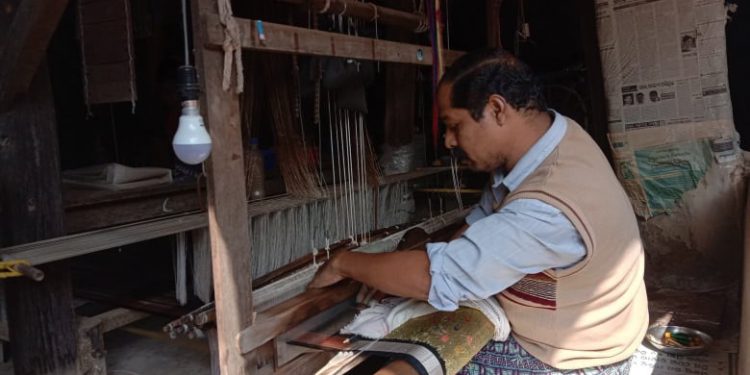Manamunda: Despite the introduction of several programmes for holistic development of handloom clusters to make weavers self-reliant, the weavers of Gabajora village in Boudh district continue to live in hardships.
According to sources, this village of Sampur panchayat houses nearly 2,000 people, of which around 1,900, belong to traditional weaver families. There are over 300 handlooms here where the famous pata sarees are woven. The village is located at about 15 km away from Baliguda.
The state government has been taking up several welfare measures like coverage of weavers under life/health insurance, supply of quality raw materials and other basic inputs, development of work-sheds and skill upgradation through vocational training, sources said. Describing the causes of financial distress, local weavers said the ripple effect of inflation has taken a toll on them. Costs of all household articles have increased only except the wages of weavers, said a weaver. “Cost of silk threads has also gone up in the meanwhile, after implementation of GST.”
Unprocessed silk thread costs about Rs 3,500 per kg and it reduces to only 600-700 gm of weavable thread after it is dipped in hot water to remove away the coating of gum, local weavers lamented. Lower-class and middleclass customers statewide prefer to buy polyester mixed sarees at cheaper rates for below Rs 5,000 to 6,000, rather than buying pure silk sarees at higher prices. As a result, some weavers are being compelled to use polyester mixed silk threads.
A local weaver Arjun Meher said, “It takes three to four persons of a family nearly three days to weave a pata saree and the wages they get against it is around Rs 2,000. Managing a household with so low wage becomes too difficult for weavers, these days.” Each family member gets a wage of Rs 200 to 250 per day. Such a precarious condition prevailing these days makes them unable to weave sarees up to the expectations of prospective buyers.
Some weavers still strive to keep the traditional skill of handlooms alive, whereas some others weave only pata sarees with pure silk threads. Premananda Meher is one such weaver who has been weaving for over three decades, along with his better half. Premananda has remained landless so far and has no money to repair his handloom that has become dilapidated over years. His work-shed that rests on a weak mud wall has also gone rundown. His wife Pushpanjali said, “As we don’t have a cultivable land and left with no other choice, we still continue with this occupation. We have not yet received any support from the state government, either under Pradhan Mantri Awas Yojana or Biju Pucca Ghar Yojana.”
It is very tough to survive as most of the weavers’ cooperative societies have become defunct. We are unable to buy silk threads and other input materials and manage from hand to mouth, she added.
PNN






































